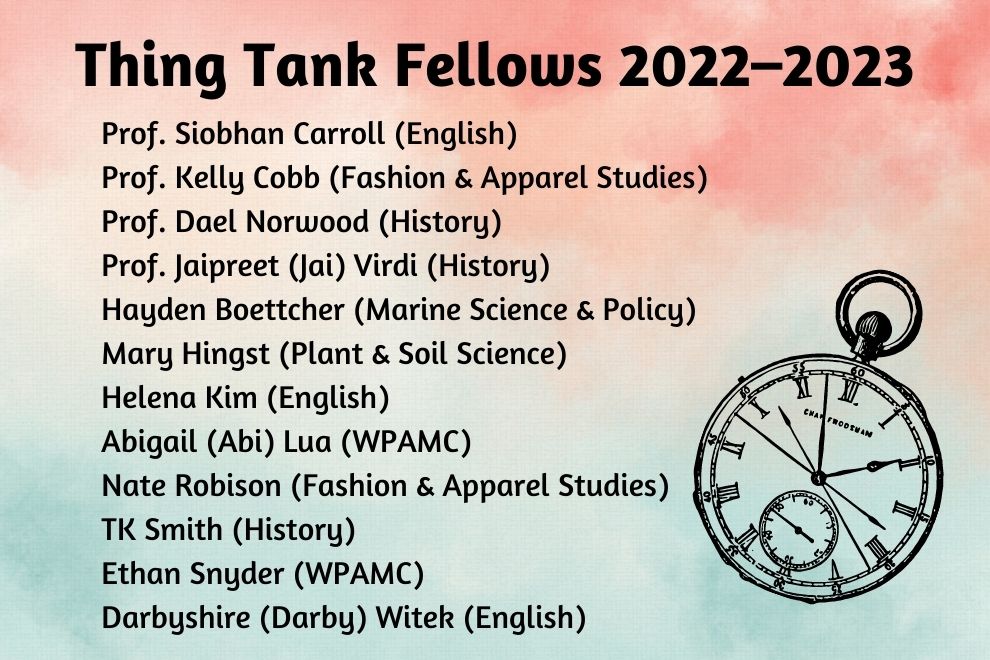Thing Tank is an annual research forum for UD faculty and graduate students. Each year, CMCS appoints four Faculty Fellows and six to eight Graduate Fellows as part of a year-long cohort. Together, they collaborate to explore a major topic in material culture studies. Fellows workshop writing-in-progress, attend biannual public talks by prominent guest lecturers, and participate in field visits to regional collections or sites. Stay tuned for information about public events!
Material Futures, the forum topic for 2022-23, explores the relationship between material culture and imaginings of the future. Amid intensifying concerns about climate, disease, and inequality, the future holds our attention in unprecedented ways. Scholars, artists, and activists are attending to the future with the hope of positively shaping it. In natural sciences, engineering, and business, material and technological innovations and future-oriented tools for prediction and projection have assumed new importance. In art, design, the humanities, and social sciences, research on the future considers the different ways it is imagined, represented, and contested.
Just as objects and materials connect people with the past, they play a fundamental role in enabling and constituting the future. From the imagined technologies of speculative fiction to the design aesthetics of “futurist” movements, material culture concretizes and brings the future to life. Objects can also embody, disclose, or foreclose what lies ahead. Ritual artifacts used by past societies to make predictions, novel substances synthesized by material scientists, and economic models that project (and performatively enact) market trends exemplify the capacity of things to shape the future. Material futures names an approach to material culture studies that asks us to consider how objects, elements, and technologies can afford or inspire future courses of action.
By bringing together material culture studies and current theoretical work on futurity, material futures initiates an interdisciplinary conversation. In the social sciences and humanities, scholars conceptualize futurity as a temporality that is socially produced, circulated, and experienced. It is understood as a phenomenon that encompasses senses of hope, optimism, and promise, as well as uneasy states of pessimism and disappointment. In addition to these temporal and affective dimensions of futurity, material culture studies encourages us to consider the ways that futurity manifests in concrete forms and practices. For instance, Jens Beckert’s sociological research in Imagined Futures reminds us that the reproduction of capitalist economic systems depends on people investing in specific objects that they believe will retain their monetary value beyond the present. Likewise, our visions of the future shape the processes and products of scientific investigation and technological innovation, as Sheila Jasanoff and Sang-Hyun Kim describe in Dreamscapes of Modernity. Questions about materiality and futurity cut across the arts and sciences, design and engineering, and other fields of study.
Through workshops, lectures, and site visits, participants in Thing Tank will explore material futures from various disciplinary angles. How are future-oriented affects encoded in and inspired by objects? How are our hopes and fears revealed through artistic, scientific, and analytical engagements with materials? How are efforts to preserve, describe, and analyze objects and artifacts connected with expectations for the future? How can we bring the methods of material culture studies to bear on questions of futurity? We invite a diversity of perspectives to consider fundamental questions about what lies ahead.




